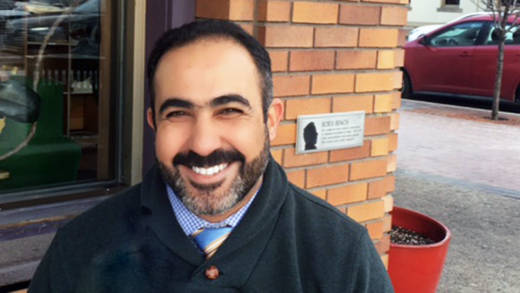Because of his work, Marwan Sweedan and his brothers faced assassination attempts. His own father was kidnapped and assassinated because of Marwan’s support of U.S. troops. Luckily, Marwan escaped to Jordan, where he worked with insurance companies as a consultant before getting help from an American friend and future mentor to receive refugee status in the United States.
His first destination upon arrival? San Francisco.
"That was a cultural shock," Sweedan chuckled, describing his first few days in the U.S. "The first time I was out was at night and it was Halloween. I called my friend, my mentor, and I told him, 'It's Halloween and I'm outside in the streets in San Francisco.' And he was laughing, 'Don't have a first impression, wait for me to explain things to you.'"
Marwan eventually got more comfortable, thanks to weekly meetings with his mentor, where they would talk about all things American culture, from politics to history to holidays. Gratitude for that relationship is one of the reasons why Marwan now spends so much of his time volunteering with Global Impact to support new refugees in their resettlement in Boise and connect them with services and jobs.
In addition to the help of his mentor, Sweedan also attributes much of his acclimation to enlisting in the Army.
Upon arriving in San Francisco, Sweedan went from being an esteemed surgeon in Iraq to working as a technician in a tissue bank. Although he was quickly promoted, he decided to join the Army as a combat medic, hoping to use his medical skills to support his adopted home country.
"I felt like I built a bridge, without carrying a weapon or being deployed," Sweedan beamed with pride. Superiors quickly realized that Sweedan’s wealth of knowledge on Iraq was an asset. Throughout his service, he gave a series of nine lectures on the customs, history, and language of Iraq to better prepare troops for their deployment. But the learning was mutual.
"Joining the military helped me learn a lot about the United States. I worked with liberals and conservatives. Maybe there were people who didn’t agree with me or didn’t like me, but we all had to work together," he says.
This across-the-aisle mentality prepared him for a move from the expensive Bay Area to Boise, a town he now loves. I was happy to hear that, but had to ask about whether he had experienced any racism and Islamophobia. Could he feel a shift?
What I got was a resounding yes. ''For a while, people here [in Boise] carried their guns, and they were walking behind Muslims here, especially women wearing their scarves.'' But the Bay Area wasn't always kind either. ''In San Francisco, I got yelled at too. I was there right as feelings towards Iraq turned for the worse.''
To my surprise, Marwan shrugged these memories off, smiled, and reminded me of two things: he had experienced worse in his similarly divided homeland, and despite his circumstances, he always aims to be a bridge of understanding.
"I lived in conservative areas and liberal areas. People don’t hate people, but ideas clash with ideas. And people are afraid of what they don’t know," Sweedan said.
Recognized by the Obama administration as a "Champion of Change," Sweedan has a clear message on people with anti-refugee beliefs: "I want to be fair to them. I understand their point of view. A lot of Americans felt like both Republicans and Democrats have failed them for the past 30 years because the government became paralyzed. On TV, you hear a lot about refugees, so a lot of people were feeling, what about us?"
I found myself moved by Sweedan’s level of empathy. It’s that sort of reflection, compassion, and curiosity that I find missing in national conversations around immigration and refugees. Sweedan risked his life and the life of his family by supporting the U.S. in Iraq. After losing his father because of this, he still decided to serve the U.S. again as an Army medic. And yet, here he was, being sympathetic to people who are often the least understanding of his plight.
He chalks it up to a general lack of understanding about the refugee experience, a reason why he continues telling his story to anyone who will listen.
"I get it. They love this country, they want to protect this country. But I love and want to protect this country too," Sweedan said.
So how does this U.S. veteran / Muslim / surgeon / Iraqi refugee identify?


